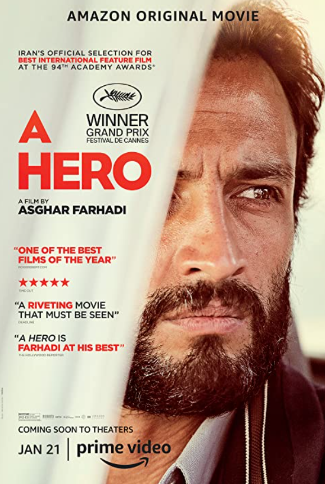
“A Hero” (“Ghahreman”) (2021). Cast: Amir Jadidi, Mohsen Tanabandeh, Sahar Goldoust, Maryam Shahdaei, Alireza Jahandideh, Saleh Karimaei, Mohammas Aghebati, Farrokh Nourbakht, Ehsan Goodarzi, Fereshteh Goldoust, Fatemeh Tavakoli, Ali Hasannejad Ranjbar, Naghameh Ghavanlou, Sarina Farhadi. Director: Asghar Farhadi. Screenplay: Asghar Farhadi. Web site. Trailer.
To truly leave a mark on one’s life, it pays to do so with a genuine sense of integrity, one that accurately reflects one’s authentic self. Such is the essence of heroism, the stuff of which legends big and small are made. But, regardless of the magnitude behind these tales, they all have one thing in common – they’re stories rooted in truthfulness, untainted by secondary considerations that can dilute or undermine the validity of the alleged primary intent. Those are among the issues raised in the new Iranian morality play, “A Hero” (“Ghahreman”).
Rahim Soltani (Amir Jadidi) can’t seem to catch a break. The onetime-painter/calligrapher is doing time in prison in Shiraz, Iran for his failure to repay a loan that he was planning to use for starting his own business. However, his creditor, Bahram (Mohsen Tanabandeh), was so displeased with what he saw as Rahim’s fiscal irresponsibility that he brought a lawsuit against him that led to his conviction and jailing. As a result, Rahim now spends his days behind bars, with his only relief from the tedium of prison being occasional short-term leaves to visit his family. He wants out of prison permanently, but the hopes of that happening are slim, despite his good behavior and active efforts aimed at helping improve the quality of prison life for his fellow inmates.
Hopes of changing all that arise while Rahim is on one of his temporary releases. Rahim and his girlfriend, Farkhondeh (Sahar Goldoust), devise a plan that they hope will lead to a potential permanent reprieve. When Farkhondeh finds a lost bag filled with gold coins, Rahim proposes using them to help pay off his debt to Bahram. The coins won’t cover the entire sum, but they represent a sizable portion of it, enough so that Rahim hopes it will show good faith and encourage Bahram to urge officials to invoke leniency toward him.
Unfortunately, Bahram is not persuaded by the offer; it’s all or nothing as far as he’s concerned. Needless to say, Rahim is disappointed at the prospect of having to return to prison when his current leave is up. And, in the meantime, he and Farkhondeh must decide what to do about the coins. Do they keep them or try to return them to their rightful owner? While the temptation to keep them is strong, Rahim decides he should try to give them back to whomever they belong.
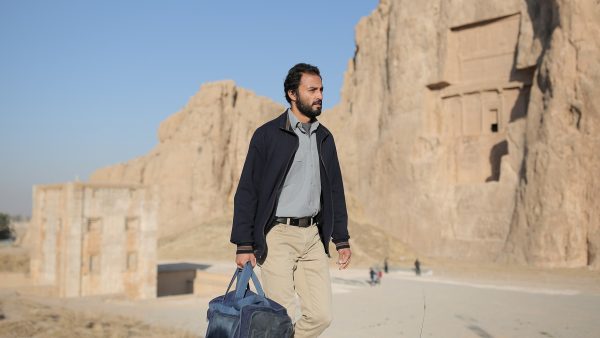
Rahim takes steps to reunite the coins with their owner, but, with his leave coming to an end, he’s unable to see his plan through. He entrusts completion of the task to his sister, Malileh (Maryam Shahdaei), and brother-in-law, Hussein (Alireza Jahandideh), with whom he had been staying while on leave. And, almost miraculously, it’s not long before the believed rightful owner (Fatemeh Tavakoli) shows up to collect them. She correctly identifies how and where the coins were lost, even including an accurate description of the bag in which they were found. But, before handing over the coins, the owner asks Malileh for discretion in the handling of this situation, claiming that her easily angered husband knows nothing about them and that she fears retribution from him if he were to find out about their existence, conditions to which Malileh readily agrees. And, with that, the owner takes her coins and leaves.
Not long thereafter, word of the coin retrieval reaches the prison. Officials, including the warden, Mr. Salehpour (Mohammas Aghebati), and cultural activities director, Mr. Salehi (Farrokh Nourbakht), are so proud of the praiseworthy act that Rahim orchestrated that they want to spread the word far and wide about their institution’s hero (not to mention the role their rehabilitation efforts inevitably played in helping to create an individual of such good character). Salehpour and Salehi arrange for media interviews that boast of Rahim’s good deed, including televised re-enactments of the event in question. However, those interviews and re-creations don’t exactly match up with what actually happened, primarily giving Rahim more credit than he actually deserved, accolades he makes no effort to deny.
This is especially true when the possibility of Rahim’s celebrated heroism translating into parole begins looming larger. Rahim longs to be free so he can marry Farkhondeh and once again become a productive, contributing member of society. He also wants to be able to spend more time with his son, Siavash (Saleh Karimaei), an adolescent with a severe stutter and occasional behavioral problems who has been living with his aunt and uncle during his father’s imprisonment. And the possibility of all of that happening is becoming so strong that he can practically taste it.
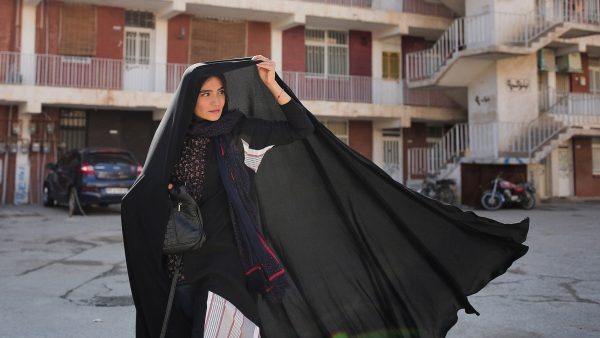
As word of Rahim’s altruism spreads, the public becomes so taken with his story that he becomes a local celebrity. The praise earns him an open-ended leave from prison and formal recognition by a respected local charity, which raises money to help Rahim pay off his debt. The organization even helps him to secure a job, guaranteeing him an ongoing income.
But, as events continue to play out, questions arise about the validity of Rahim’s story. That’s especially true when he undergoes a screening interview for his new job conducted by a no-nonsense interrogator, Mr. Nadeali (Ehsan Goodarzi), who wants to verify the facts of Rahim’s claims. In particular, Mr. Nadeali is interested in speaking with the owner of the returned coins, but, when Rahim, Malileh and Hussein go looking for her, she’s nowhere to be found, raising all manner of questions about the truthfulness of this supposedly heroic tale. Those matters become further complicated when doubts arise about everything that Rahim claimed to have done in connection with the coins’ retrieval, prompting the entire situation to spiral out of control – and causing the onetime-hero’s reputation to become irreparably tarnished.
Indeed, the circumstances here truly would seem to bear out the notion that no good deed goes unpunished. At the same time, though, does that rule out the possibility of redemption? That remains to be seen, especially when one takes a close look at the specifics involved in scenarios like this. Rahim should be careful not to lose hope; things may yet work out in his favor. He just might wind up a hero after all.
When looking at Rahim’s situation, one can’t help but wonder why circumstances always seem to dump on him. It always appears as though Murphy’s Law is constantly dogging him; if something can go wrong, it invariably does, perpetually making his life difficult. But, upon close scrutiny, one could contend that it’s not entirely surprising that matters turn out as they do. And, for what it’s worth, the causes originate with him and his beliefs, the building blocks of his existence thanks to the conscious creation process, the philosophy that makes this possible.
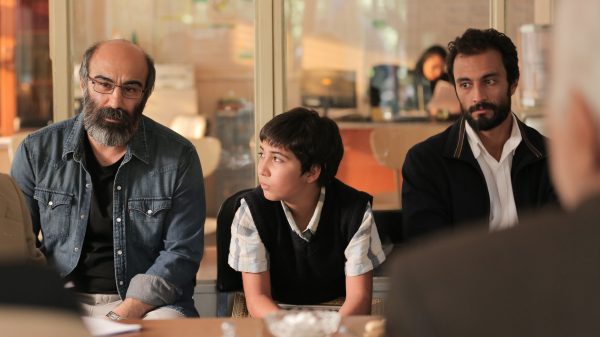
Even though Rahim routinely proclaims how much he values his integrity, it seems as though there’s an underlying caveat attached to that notion. Indeed, while publicly preening about the benevolence behind his gesture, Rahim also quietly holds on to a secondary intent that isn’t entirely authentic nor compatible with the first: He hopes that his honesty will lead to his parole and his ability to get his life back on track. Now, while there’s nothing inherently wrong with wishing for the emergence of such developments, secretly hoping that his magnanimity will serve as a springboard to their appearance nevertheless taints the supposedly sincere altruism that he professes to believe in. Those beliefs, in turn, are reflected in the reality that subsequently manifests, one in which the purity of the notions he claims to embrace has become blemished by the secondary considerations resident in his consciousness. Indeed, we must truly be careful what we wish for.
This, of course, raises questions about Rahim’s ability to genuinely walk his talk. It’s something that even he subconsciously doubts at times as evidenced by simple gestures like facial expressions. During interviews, for example, Rahim frequently exhibits sidelong glances that suggest he’s being less than truthful about what he’s saying, and those responses begin triggering doubts about his story and its details. Is it any wonder, then, that his claims would come under scrutiny? What’s more, is it any surprise that his experience turns out as it does? It shouldn’t, given the mixture of intents that underlie its creation. After all, that’s how conscious creation fundamentally works.
In light of how events turn out here, one can’t help but wonder how Rahim became embroiled in these circumstances to begin with, all the way back to when he became imprisoned in the first place. If he was being less than honest with himself and others when initially taking out the loan, for example, then is it a surprise that his supposed plans didn’t unfold as hoped for? Then there was the incident when he was unsure about whether or not to return the coins. And, of course, there were the ongoing “accommodations” that he had to make in telling his heroic story as doubts arose about its validity.
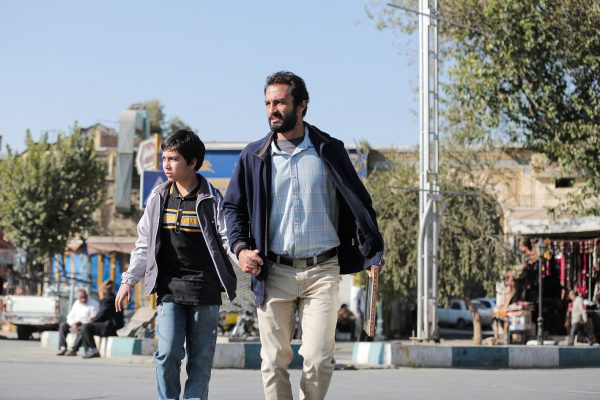
This would all suggest that Rahim’s potential inability to be clear with himself about his beliefs and intents could pose an issue for him in accurately manifesting the reality he hopes to achieve. Even more fundamentally, it raises questions about what exactly constitutes the nature of his true beliefs and authentic self. This thus gives Rahim – and anyone else similarly situated – much to ponder. Profound introspection is definitely called for here.
Still, despite the difficulties Rahim has experienced in these areas, he nevertheless appears to retain aspirations about wanting to live the life of a hero. He may feel desperately disappointed with the way things have turned out in this scenario, both in terms of addressing these particular circumstances and fulfilling his overarching objective. But that doesn’t mean other opportunities won’t present themselves to him, especially if he wants to see that objective brought to fruition. He would seem to see heroism as his destiny, what conscious creators refer to as their value fulfillment. But, in order to make that happen, he must conceive of the conditions (and their underlying beliefs) that enable such an outcome. And, as his most recent experience has shown, he must make sure that his beliefs are authentic, unencumbered by considerations that could potentially undermine or distort what he’s hoping to achieve. After all, that’s what a hero should hope for, particularly one seeking redemption.
It’s gratifying that there’s a film from Iranian director Asghar Farhadi that I can at last genuinely recommend. This morality play, typical of many of the filmmaker’s works, weighs the consequences of honorably doing the right thing or personally benefiting from someone else’s apparent misfortune. As Farhadi’s best work, this production engages viewers with its carefully crafted deliberate ambiguity and heartfelt emotion for a protagonist who can’t seem to catch a break. Even with that, though, the film still bears some of the hallmarks that typically undermine this director’s pictures – a narrative that’s a little too obvious, longwinded ethical discussions that could stand some judicious editing, a script that could be improved with greater subtlety – but, thankfully, those issues are far less pronounced here than in his other works. It’s taken Farhadi some time to at last get things right, but, fortunately, he has done it here. We can only hope that he continues along this path in future productions. The film is available for streaming online.
As with many of Farhadi’s other films, “A Hero” has received a number of accolades. At the 2021 Cannes Film Festival, the picture won the Grand Prix Award and the François Chalais Award and received a Palme d’Or nomination, the event’s highest honor. It also captured two awards from the National Board of Review for best foreign language film and best original screenplay. In addition, it earned nominations for best foreign language film in the Critics Choice Award and Golden Globe Award competitions.
Aspiring to become a hero is one of the most noble pursuits in which we can engage. It embodies qualities we’d all like to believe we can possess and exhibit to a world in need of inspiration. But it’s not something to be approached casually or without adequate preparation, particularly when it comes to assessing the attributes a hero must exemplify. It truly is a process of getting real, one in which we need to scrutinize how genuinely we personify the traits that go into validating the exalted designation we seek. That in itself is a heroic act, but, should we ultimately and legitimately attain the sought-after goal, we can take pride in the accomplishment – and become the heroes we’ve always aspired to be.
Copyright © 2022, by Brent Marchant. All rights reserved.

No comments:
Post a Comment